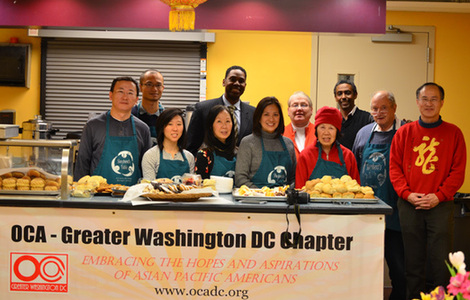Port dispute over, shelves take time to restock
Updated: 2015-02-25 11:46
By Lia Zhu in San Francisco(China Daily USA)
|
||||||||
For this Lunar New Year, many Chinese people may feel a little less "Chinese" because their favorite decorations and festival foods are stranded on container ships at anchor off the US' West Coast thanks to a protracted labor dispute between the longshoremen's union and port employers.
"We were short of traditional Chinese pastry, sweets, soybean sauce, noodles and especially the popular New Year gift baskets," said Taylor Chow, spokesman for the Oriental Food Association in the San Francisco Bay Area, whose members import food from the Chinese mainland, Hong Kong and Taiwan.
The nine-month slowdown caused by the labor stand-off at West Coast ports, critical gateways for US-Asia trade, has crippled the container traffic and disrupted the supply chain, hitting Chinese food distributors who had expected more business during the 15-day Chinese New Year, which lasts from Feb 19 till March 5.
"We just received a container this morning, which was supposed to arrive on Jan 8," said Chow on Feb 24. He runs a food distribution company in Oakland.
The Port of Oakland, which significantly impacts Chow's and many other businesses, resumed full operations at its five marine terminals on Tuesday morning, four days after a tentative settlement was reached by the International Longshore and Warehouse Union (ILWU), which represents 20,000 West Coast dockworkers, and the Pacific Maritime Association (PMA), which negotiates for ship owners.
Oakland is the last of the 29 seaports on the West Coast that have resumed full operation after undergoing a suspension of day shifts on Monday due to what the port called "a temporary shortage of experienced crane operators".
As of Tuesday morning, nine vessels were being unloaded and 17 others awaiting berths in San Francisco Bay, according to Oakland Port Spokesman Mike Zampa.
The cargos on the ships include anything from machine parts for factory assembly lines to household goods and toys.
"A full complement of longshore labor has reported for duty and truck traffic is light at all terminal gates," according to the port's latest status report.
"We hope vessel operation can get back to normal as soon as possible, so our clients can restock their shelves before the New Year ends," said Chow, whose company has lost hundreds of thousands of dollars a month at worst.
"Hopefully we can get our orders back," he said, adding that he has lost some clients since the slowdown worsened last October.
Compared to some of the other importers who deal with perishable produce, Chow considered himself fairly lucky. "Some of my friends imported ginger. Having been stored one to two months in the containers, it must have gone bad," he said.
The recent escalation of the dispute has dramatically slowed US farm and manufacturing goods as well, said Stanley Kwong, professor of international marketing at University of San Francisco.
"It was especially damaging for fresh fruit growers as loads of California fresh citrus were stranded in warehouses rotting on the docks. The just-in-time delivery system used by many factories and retailers leaves little margin for delay," he said.
"The Spring Festival period is normally the busiest time of year for local packers sending citrus to Asia," said Kwong. California producers who rely on foreign exports include growers of fresh fruit, alfalfa, almonds, walnuts, rice and wine grapes.
Maritime officials warn that it could take six to eight weeks for Oakland and other West Coast ports to recover from the cargo backlog and more time to finally restore full productivity, though cargo movement should improve soon.
"Ships, containers and chassis are all out of balance. They're not where they need to be to support cargo movement. Repositioning of these assets will take some time," the Port of Oakland explained.
liazhu@chinadailyusa.com
Most Viewed
Editor's Picks

|

|

|

|

|

|
Today's Top News
US State Dept calls for cyber security boost
Anbang buys another piece of Manhattan
California here we come: Chinese
Port dispute over, shelves take time to restock
School, firm to link up in cancer fight
Killer of 'American Sniper' Kyle jailed for life
Alaska quietly becomes 3rd US state to legalize marijuana
Highly skilled immigrant spouses can soon work in US
US Weekly

|

|















